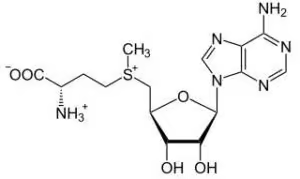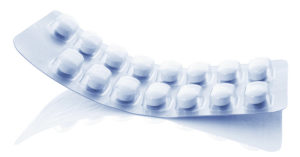Table of Contents
Key Takeaways
- SAM-e (S-Adenosyl Methionine) is a naturally occurring amino acid crucial for brain health and bodily functions.
- It regulates neurotransmitters, impacting mood, memory, and behavior.
- SAM-e treats depression and anxiety effectively, faster than traditional antidepressants and without their side effects.
- SAM-e enhances neuroplasticity, brain-cell membrane fluidity, and muscarinic receptors, leading to improved learning, memory, and mood.
- SAM-e supplementation with B vitamins at recommended dosages of 400 to 1600 mg daily benefits conditions like depression, anxiety, osteoarthritis pain, fibromyalgia, and chronic liver disease.
SAM-e (S-Adenosyl Methionine, Ademethionine, Adomet) is the naturally-occurring amino acid methionine bound to an ATP molecule. And is found in nearly every cell in your body.
SAM-e helps produce and breakdown the neurotransmitters acetylcholine, dopamine, serotonin, norepinephrine and melatonin in your brain. SAM-e maintains cell membranes and plays a role in a healthy immune system.
Studies show that SAM-e is very effective in treating depression without the side effects of prescription antidepressants. And while pharmaceutical antidepressants can take from 6 to 8 weeks to begin working, SAM-e can work much faster.
The latest research shows that SAM-e can be anti-anxiety, reduces pain including in fibromyalgia, and can improve learning, memory and mood.
SAM-e helps:
- Neuroplasticity. SAM-e is involved in the formation of myelin that surrounds and protects axons. And SAM-e can improve brain-cell membrane fluidity. Enhancing the function of neuroreceptors.
- Neurotransmitters. SAM-e is involved in the synthesis of acetylcholine, dopamine, serotonin, and norepinephrine. Helping to normalize mood, moderate behavior, and elevate emotions.
- Neuroprotectant. SAM-e helps produce the powerful antioxidant glutathione through a process called transsulfuration. SAM-e helps stabilize cell membranes and promotes the secretion of bile. And through a process called aminopropylation, SAM-e is converted into the antioxidant methylthioadenosine, which has anti-inflammatory and analgesic (pain-relieving) properties.
What is SAM-e?
SAM-e (S-Adenosyl Methionine) is a naturally occurring coenzyme that plays many critical roles in your body.

SAM-e is made from methionine and ATP (adenosine triphosphate) during a cycle that recycles the amino acid homocysteine. This cycle requires Vitamin B6 and B12 and folate (B9) to work properly.
SAM-e is a precursor to the crucial antioxidant glutathione which is used in your brain and liver. When glutathione levels drop in your body, liver damage from oxidative stress begins within seconds of exposure to alcohol or toxins.
SAM-e is a methyl donor that contributes to several essential processes in your brain. As a methyl donor, SAM-e is involved in the production and recycling of hormones, cytokines, and the neurotransmitters acetylcholine, dopamine, norepinephrine, and serotonin.
This methyl donor process is call ‘methylation’, and contributes to gene expression. Affecting how your cells work and communicate including your cell DNA.
SAM-e modifies important molecules in cell membranes that control communications within and between brain cells. SAM-e boosts the number of muscarinic receptors in certain parts of your brain which are critical to this cellular communications network.
SAM-e is used to treat depression, anxiety, osteoarthritis pain, fibromyalgia, and chronic liver disease.
SAM-e is sold as an OTC dietary supplement in the United States and Canada. And as a prescription drug in several European Union countries, and Russia. SAM-e is marketed under the brand names Adomet, Gumbaral, Samyr, Heptral, Agotan, Donamet, Isimet and Admethionine.
How does SAM-e work in the Brain?
SAM-e boosts brain health and function in several ways. But two in particular stand out.
- SAM-e helps alleviate depression. SAME-e is one of the main building blocks your brain needs to produce the neurotransmitters acetylcholine, dopamine, serotonin, norepinephrine and melatonin. By raising the levels of dopamine in your brain, SAM-e helps enhance memory, motivation and learning.
Researchers at the West Los Angeles VA Medical Center studied the antidepressant effect of oral SAM-e in a randomized, double-blind, placebo-controlled trial for 15 patients with major depression.
The researchers found that SAM-e is a safe, effective antidepressant with few side effects and a rapid onset of action. And may be useful for those who cannot tolerate prescription tricyclic antidepressants.[i]
- SAM-e directly influences neuronal signaling. SAM-e increases the number of muscarinic receptors in the hippocampus. We have two kinds of acetylcholine (ACh) receptors in our brain. 1) Nicotinic receptors and 2) Muscarinic receptors
Most of the nootropics we investigate here at Nootropics Expert influence nicotinic receptors and ACh. Muscarinic receptors have a very different mechanism of action. They are part of a large family of G-protein-coupled receptors (GPCRs) which are used as an intracellular secondary messenger system.
Your brain has a very complex system of control to regulate different processes going on in different cells at different times. For this to work, there must be a sophisticated means of communication between cells.
GPCRs and their G proteins provide this intercellular communication. And form one of the most important signaling systems in your brain. They are involved in nearly every aspect of your physiology and behavior.
G proteins work by binding neurotransmitters, hormones, growth factors, cytokines, odorants and photons at the cell surface to the GPCR, and activating that receptor. Everything you see, hear, smell, or taste goes through this signaling process.
And SAM-e increases the number of these muscarinic receptors in parts of your brain, including your hippocampus. In one study, aged rats were given SAM-e for 30 days. Supplementation with SAM-e restored the number of muscarinic receptors to levels found in the same areas in young animals.[ii]
Supplementing with SAM-e to increase muscarinic receptors in your brain can boost neuroplasticity and increase learning, memory, mood and even smell and vision.
How things go bad
You have healthy levels of SAM-e throughout your body when you’re young. But as you age, your body makes less of it. This is why young people bounce back from difficult experiences more easily. They’ve got higher levels of dopamine and a higher pain threshold than adults.
SAM-e is a major methyl donor in your body. It is involved in the biosynthesis of hormones, neurotransmitters, proteins and phospholipids.[iii]
SAM-e participates in a sequence of events involving folic acid (folate) and Vitamin B12. Folate converts to 5-MTHF (5-methyltetrahydrofolate) which converts freely circulating homocysteine back into the amino acid Methionine (using Vitamin B12). L-Methionine then binds to an Adenosine group from ATP to create SAM-e.
SAM-e is then able to donate methyl groups (called methylation) to a variety of reactions including the production and breakdown of the neurotransmitters dopamine, serotonin, norepinephrine and melatonin in your brain.
This methylation process degrades SAM-e into S-Adenosylhomocysteine. Which is then fed back into this cycle from the beginning. This process is referred to as a ‘one-carbon cycle’.
If you don’t have enough folate or Vitamin B12 available, this SAM-e methylation process breaks down. And the result can be depression, brain fog, poor recall and memory, and pain.
This lack of folate and Vitamin B12 can affect you regardless of age. This is a big enough problem that the Canadian government mandated folate fortification of all flour, and some corn and rice products to address this issue in 1998.[iv]
Low levels of SAM-e, methylfolate, Vitamin B6 and B12 can lead to all kinds of problems. And genetic defects that don’t allow the use of these important vitamins can result in the same symptoms.
↓ Cognition, memory, recall, and mood diminish
↓ Methylfolate, Vitamin B6 & B12 absorption declines
↑ Homocysteine levels rise
↑ Pain levels rise
↓ Mental health, language and fine motor skills decline
All of these changes in brain energy metabolism are contributing factors to neurodegenerative diseases, including Alzheimer’s, Parkinson’s, ALS, epilepsy, dementia, and other cognitive symptoms.
But even if you’re not concerned with genetic defects, a lack of B-Vitamins, or the effects of aging, SAM-e can help.
SAM-e benefits
Stress-related disorders like anxiety, major depression and PTSD are some of the most debilitating illnesses known to man. And if you’re reading this, and dealing with any of these, supplementing with SAM-e may help.
To cope with stress requires changes in the expression of “immediate-early genes” in your hippocampus. The same area of your brain you use for learning and memory.
Stressful events result in epigenetic (gene) modifications within ‘immediate-early genes’ in your hippocampus neurons. DNA methylation acts to suppress the expression of these genes. This is where SAM-e comes in…
SAM-e is a methyl donor for the enzyme that methylates your DNA. When SAM-e levels are high enough, a stressful event will not result in DNA de-methylation.
Instead, a stressful event enhances DNA methylation of ‘immediate-early genes’. Which suppress their expression and allows you to adapt in a healthy way to this stressful situation.[v]
SAM-e is a powerful antidepressant. In 2005, researchers combed through the databases of Medline, Psychinfo, AMED, and Cochrane Controlled Trials Register. And collated the findings of randomized, controlled trials studying SAM-e for depression through to September 2001.
The team concluded after analyzing all the clinical evidence that SAM-e was effective in treating major depression in adults.[vi]
SAM-e is also a potent pain-killer. A recent study looked at 56 people with arthritis in their knees for 16 weeks. One group took the COX-2 inhibitor Celebrex while the other group took SAM-e.
Researchers found that SAM-e was as effective as Celebrex at eliminating pain. And without the potential side effects of heart attack or stroke that can be caused by using Celebrex.[vii]
Another study on the effect of SAM-e with 17 fibromyalgia patients confirmed a close relationship between primary fibromyalgia and psychologic problems including depression.
SAM-e treatment improved the depressive state of these patients. And SAM-e was found to be an effective and safe therapy in the management of fibromyalgia.[viii]
How does SAM-e feel?
For some, supplementing with SAM-e can be life-changing.
SAM-e can have a profound effect on emotions, depression, and feelings of anxiety. You may experience improved concentration, energy, alertness, and feelings of well-being. Even vision can become clearer.
Once you start supplementing with SAM-e, you should experience at the very least, a general sense of well-being.
SAM-e works particularly well for those who deal with depression or anxiety. Neurohackers report that they no longer have panic attacks. And the feeling of doom is gone.
Adding SAM-e to your nootropic stack can improve sociability, and not feeling overwhelmed by life. Brain fog lifts and thinking is clearer and faster.
Others say that the “dark cloud has lifted”, and all the negativity and stress is gone. Things that normally would irritate are just brushed off, and you move on.
One big word of caution: SAM-e needs Vitamins B6 & B12 and folate to work. Or supplementing with SAM-e may be a waste of time and money because without adequate levels of these B-Vitamins it will not provide any benefit.
You’ll notice reference to B-Vitamins several times in this article on SAM-e. It is that important. Use Vitamin B6 & B12 and folate every day that you supplement with SAM-e. Or use a B-Complex formula that contains methylfolate (B9) (avoid folic acid).
SAM-e Clinical Research
SAM-e Lifts Mood
We have made significant progress in the last 100 years in diagnosing and treating depression. And yet, 10’s of millions still suffer from depression. In 2014, an estimated 15.7 million adults in the United States had at least one major depressive episode in the past year.[ix]
In the United States, one in ten Americans are using antidepressants.[x] I don’t have statistics from other countries but I suspect many have similar problems. Unfortunately, antidepressants only work 30 – 50% of the time. And often come with a host of side effects.
One reason that many people continue to suffer from depression is that most doctors are not aware of the link between homocysteine and depression.
If you’re dealing with depression and have had little success with antidepressants, you may have something as simple (and as serious) as a folate deficiency. Or low levels of Vitamin B12. Studies show a link between folate deficiency and impaired metabolism of serotonin, dopamine, and norepinephrine.
One study looked at 46 patients with severe depression. 24 of these patients had raised levels of homocysteine. And significantly lower levels of folate, SAM-e, and other metabolites.
The researchers concluded that looking at total homocysteine levels could be a measure of depression. When it is caused by a folate deficiency, impaired methylation (SAM-e), and poor neurotransmitter metabolism (SAM-e). And a potential benefit to simply using vitamin replacement to treat severe depression.[xi]
Or supplementing with SAM-e to treat depressive symptoms.
SAM-e for ADHD in Adults
Ritalin and Adderall are thought to be the most effective treatment in children and adults with ADHD. These stimulants work by potentiating both dopamine and norepinephrine at the synaptic cleft. But stimulant meds for ADHD come with side effects.
SAM-e acts as a methyl donor and is involved in many metabolic pathways. It has both adrenergic and dopamine receptor agonist activity.
A research team at the University of California used SAM-e with subjects diagnosed with Adult ADHD in a 9-week double-blind, placebo-controlled trial.
The research team found that 75% of the patients had a significant improvement in ADHD symptoms while using SAM-e. And the 25% who did not respond to SAM-e, did not respond to Ritalin either.[xii]
SAM-e Treats Depression
Scientists at the US Department of Health and Human Services conducted an analysis of 102 individual studies in 25 databases on SAM-e and depression in 2002. The report distilled data gleaned from published studies conducted around the world up to 2002.
This comprehensive report is called, “S-Adenosyl-L-Methionine for Treatment of Depression, Osteoarthritis, and Liver Disease.” The researchers found that SAM-e is just as effective as standard antidepressant drugs at treating depression.
The agency concluded, “Treatment with SAM-e was equivalent to standard therapy for depression”.[xiii]
SAM-e Recommended Dosage
Recommended dosage of SAM-e for nootropic benefit is 400 mg per day.
SAM-e for depression: 400 – 1600 mg daily in divided doses
SAM-e for bone and joint health: 200 – 1200 mg daily in divided doses
SAM-e for liver function issues: 1600 mg daily in divided doses
SAM-e for alcoholic liver disease: 600 – 1200 mg daily in divided doses
Some research and many user reports suggest that once positive effects are achieved, SAM-e doses can be reduced. Some report benefit with as little as 100 mg of SAM-e daily.
Studies show that SAM-e should be consumed with B-Vitamins. When SAM-e donates its methyl group, it breaks down into homocysteine. Elevated homocysteine levels are associated with increased heart disease, birth defects and depression.
Choose a bioactive B-Complex to use with SAM-e. Like the high quality B-Complex like Performance Lab® B-Complex which contains therapeutic amounts of each of the B-Vitamins you need while using SAM-e.
In order to prevent homocysteine accumulating, logic tells us based on its mechanism of action that sufficient levels of B-Vitamins must be present to convert homocysteine into the potent antioxidant glutathione.
Take SAM-e on an empty stomach and an hour before eating any food. SAM-e is best digested in your intestines and not your stomach. Not letting SAM-e settle into your digestive tract could cause stomach upset.
SAM-e Side Effects
SAM-e is produced naturally in your body. So is considered well-tolerated and safe.
If you have bipolar disorder, you could develop mania when supplementing with SAM-e. So check with your doctor before using SAM-e.
If you’re on antidepressant medication, you should check with your doctor before supplementing with SAM-e.
High doses of SAM-e can cause gas, upset stomach, diarrhea, constipation, dry mouth, headache, dizziness, anxiety or skin rashes. SAM-e may also trigger an allergic reaction in some people.
Type of SAM-e to buy
SAM-e is available in 200 and 400 mg tablets.
For optimal effects with SAM-e, stable, enteric-coated tablets are recommended. SAM-e should be taken on an empty stomach, either one hour before or two hours after meals.
SAM-e is highly unstable so check expiration dates. And you should get tablets that are packed in sealed, gel-packs for freshness.
Avoid SAM-e in powder form as you’ll likely be unsatisfied with the results.
Nootropics Expert Recommendation
SAM-e 400 mg per day
 I recommend using SAM-e as a nootropic supplement.
I recommend using SAM-e as a nootropic supplement.
Your body does make some SAM-e on its own. But SAM-e levels decrease as we age. And you cannot get SAM-e from food.
SAM-e is critical for the methylation process needed for making important neurotransmitters including acetylcholine, dopamine, serotonin, norepinephrine and melatonin.
SAM-e is also involved in the cycle which produces the critical antioxidant glutathione. And it’s involved in maintaining brain cell membrane integrity and fluidity.
SAM-e increases muscarinic receptors in your hippocampus which boosts the activity of acetylcholine and other critical neurotransmitters in your brain. Leading to improved learning, memory and mood.
SAM-e is especially helpful if you’re dealing with depression. Or having difficulty coping with any kind of stress.
We suggest a dose of 400 mg daily. It may take a while for SAM-e to build up in your system. So be patient. Once you’re achieving the affects you want from SAM-e, you can eventually try scaling back your dose to 100 or 200 mg.
SAM-e needs Vitamins B6 & B12 and folate to work. Or SAM-e may not provide the benefit you are looking for. Most integrative medicine doctors and naturopaths recommend stacking a high quality B-Complex when using SAM-e. So make sure you stack SAM-e with the B-Vitamins listed above, or a good Vitamin B Complex formula that uses methylfolate (NOT folic acid).
A high quality B-Complex containing these bioactive B-Vitamins like the Performance Lab® B-Complex .










Join The Discussion - 404 comments
Unknown
May 15, 2025
If you take l-methionine instead of Sam-e, will the results be somewhat similar or are the differences drastic?
David Tomen
May 15, 2025
SAM-e is made from methionine and ATP (adenosine triphosphate) during a cycle that recycles the amino acid homocysteine. This cycle requires Vitamin B6 and B12 and folate (B9) to work properly.
If you have enough homocysteine along with Vitamins B6, B9 & B12 and your mitochondria are producing enough ATP then yes you could use methionine. If you don’t, or your not sure, then taking SAM-e as a supplement short cuts this process and does the job.
Unknown
May 16, 2025
Thanks, I really appreciate it
Adam
January 26, 2025
Hello David,
Does Sam-e interact with SSRIs or Lexapro? Would it cause serotonin syndrome since it help produce neurotransmitters for serotonin? I would ask my doctor but they don’t seem very knowledgeable about these things. I suppose I can ask the pharmacist when I go next. Thanks
Also, would you be able to write an article about SSRIs and a list of nootropics that may interact with them with a little info about the safety/risks and maybe like the dosage while taking SSRIs? When your not busy and have time of course.
David Tomen
January 27, 2025
Adam, there is no reported contraindication between SAM-e and Lexapro. Some say SAM-e is more effective for them compared to Lexapro. Usually it is one or the other but not both. SAM-e is involved in the synthesis of acetylcholine, dopamine, serotonin, and norepinephrine. But does not directly increase serotonin.
Thanks for the idea of an article about SSRIs and contraindications. Good ides and I’ll add it to my list.
Megan Ward
November 23, 2024
I was wondering if the B vitamins need to be taken at the EXACT same time as the Sam-e? I was taking 200mg Sam-e at 6am and again around 11am. The B vitamins are part of breakfast, which is in between these two times. Is that appropriate? Thank you!
David Tomen
November 23, 2024
Megan, you’ll be OK as long as you have the B-Vitamins in your system. Keep in mind that they are water soluble so your body cannot store unused vitamins. The unused vitamins are excrete in urine.
So, if you are using a B-Vitamin like Life Extensions BioActive B-Complex you should use one capsule in the morning and the other capsule at noon.
Megan Ward
November 23, 2024
Thank you so much! Would it be better to take the B vitamins WITH the Sam-e? Or, better to take the B vitamins with food? And therefore stagger the Sam-e and B vitamin doses by a couple hours? Thank you!
David Tomen
November 24, 2024
Megan, you don’t need to “stagger” your intake of your B Vitamins as long as you are using them every day. That will help keep a steady level in your system from day to day. And they do not need to be taken with food because they are water soluble.
Danielle
November 15, 2024
Hi,
You’ve stated to take a B-Complex that uses methyl folate NOT folic acid, but I just read the ingredients of the B-Complex by Performance Lab and it has folic acid in it?
David Tomen
November 17, 2024
Danielle, the Performance Lab B-Complex definitely uses methylfolate. It’s their copywriter who messed up. I’ve told them to fix it but clearly it hasn’t happened yet. Thanks for the heads up.
Larry
September 6, 2024
Hi David – I know there are concerns about taking Methylene Blue with antidepressants, but would there be a problem taking SAM-e with Methylene Blue?
David Tomen
September 7, 2024
Larry, unknown but possibly.
Melissa
August 1, 2024
Hello David,
What specific brands of SAM-e do you recommend?
Thank you
David Tomen
August 1, 2024
https://geni.us/qlANe (Amazon)
Joseph Gosselin
July 21, 2024
Should SAMe be cycled? If so at what increment?
David Tomen
July 23, 2024
Joseph, scroll back up an learn how SAM-e works so you will understand why it does not need to be cycled. You either need SAM-e or you don’t. There is no in-between with this supplement. And if you do decide to use SAM-e make sure you take it with a BioActive B-Complex.
Yusuf
July 20, 2024
Hi David, How does SAM-e compare to trimethylglycine especially for methylation?
David Tomen
July 23, 2024
Yusuf, TMG donates a methyl group to homocysteine. Once TMG adds a methyl group to homocysteine to produce methionine, the methionine can then be converted to SAMe.
Zanzara
February 25, 2025
Hi David,
I have recently started taking 800 mg of SAMe a day after taking a break from it. Can I safely pair it with 30 mg of Saffron without any danger of serotonin syndrome?
David Tomen
February 25, 2025
Zanzara, Serotonin Syndrome is typically caused by combining the wrong prescription drugs. Not combining natural nootropic supplements. SAM-e and Saffron combined will not cause a problem.
Zanzara
February 28, 2025
Thank you for clarifying!